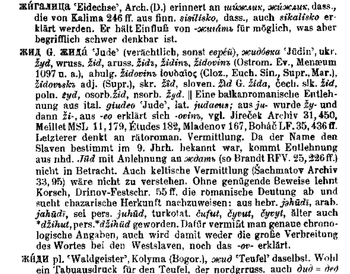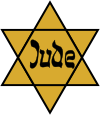Zhyd
Zhydovka (zhyd) and zhidovka (zhid) are terms for Jewish woman and Jewish man, respectively, in several Slavic languages.[1][2][3]

In modern Russian (жидовка / жид), it has been an anti-Semitic pejorative, similar to the word yid, since the mid-19th century.[1][4] Under the influence of Russian, the terms have also become pejorative in modern Ukrainian (жидівка / жид, zhydivka / zhyd) and were banned by the Soviet authorities in the 1930s.[5][6][7]
In most other Slavic languages, such as Polish (żydówka / żyd), Czech (židovka / žid), Slovak (židovka / žid), Slovene, and Croatian—as well as Hungarian which is heavily influenced by Slavic languages—these terms are not pejorative, as they simply translate as 'Jew'.
Ukrainian language
Nikita Khrushchev commented on the term in his memoirs:[8]
I remember that once we invited Ukrainians, Jews, and Poles...to a meeting at the Lvov opera house. It struck me as very strange to hear the Jewish speakers at the meeting refer to themselves as 'yids'.… "We yids hereby declare ourselves in favor of such-and-such." Out in the lobby after the meeting, I stopped some of these men and demanded "How dare you use the word 'yid'? Don't you know it's a very offensive term, an insult to the Jewish nation?" "Here in the Western Ukraine it's just the opposite," they explained. "We call ourselves yids.... Apparently what they said was true. If you go back to Ukrainian literature...you'll see that 'yid' isn't used derisively or insultingly."
21st-century controversies
In December 2012, Ukrainian politician Ihor Miroshnychenko of the Svoboda party wrote on Facebook that Hollywood actress Mila Kunis is "not a Ukrainian but a zhydivka."[2] Ukrainian Jews protested the use of term.[5] Svoboda officials and Ukrainian philologist Oleksandr Ponomariv argued that in the Ukrainian language, the word does not always have the anti-Semitic connotations that it does in the Russian language, though Ponomariv warned that the term would be considered offensive by Jewish people.[9][10][nb 1]
The Ukrainian Ministry of Justice declared that Miroshnichenko's use of the word was legal because it is an archaic term for Jew and not necessarily a slur.[9] In a letter of protest directed to then-Prime Minister of Ukraine Mykola Azarov, the term Zhydovka was described by Rabbi Marvin Hier of the US-based Simon Wiesenthal Center as an "insidious slur invoked by the Nazis and their collaborators as they rounded up the Jews to murder them at Babi Yar and in the death camps."[2]
Iryna Farion defends the usage of the term zhyd in Ukrainian, claiming that the pejorative meaning to the previously neutral word was the result of Russification during the Soviet times, when the Russian word yevrei for 'Jews' was forced into the Ukrainian language.[12]
Notes
References
- Klier, John D. 1982. "Zhid: Biography of a Russian Epithet." The Slavonic and East European Review 60(1):1-15. JSTOR 4208429.
- "Mila Kunis Targeted By Anti-Semitic Ukrainian". TMZ. Retrieved 21 December 2012.
- LaZebnik, Edith (1979). Such a Life. G. K. Hall. p. 108. ISBN 978-0-8161-6662-6. Retrieved 21 December 2012.
- Gelblum-Bross, Roma (1992). To Samarkand and Back. Roma Bross Reg'd. p. 110. ISBN 978-0-9695913-0-6. Retrieved 21 December 2012.
- "Ukrainian government: Anti-Semitic pejorative used against Mila Kunis is legal". Jewish Telegraphic Agency. 20 December 2012. Retrieved 21 December 2012.
- Harvest of Despair: Life and Death in Ukraine Under Nazi Rule by Karel C. Berkhoff, Belknap Press of Harvard University Press, 2008, ISBN 0674027183 (page 60)
- Яременко В. і Сліпушко О.. Новий тлумачний словник української мови. — К. : Аконіт, 2000. — Т. 2 (Ж—О). — С. 26. — ISBN 966-7173-02-X.
- Khrushchev, Nikita. 1971. Khrushchev Remembers. New York: Bantam Books. p. 145.
- Winer, Stuart. 19 December 2012. "Ukraine okays ‘zhyd’ slur for Jews." The Times of Israel.
- Glavcom.ua, Oleksandr Ponomariv [Олександр Пономарів], 28 November 2012, Reason to believe the word "жид" is not anti-Semitic (Підстав вважати слово "жид" антисемітським немає).
- of Despair: Life and Death in Ukraine Under Nazi Rule by Karel C. Berkhoff, Belknap Press of Harvard University Press, 2008, ISBN 0674027183 (page 60)
- Ірина Фаріон, СЛОВА ЯК СВІДКИ ПРАВДИ Лінгвістична експертиза етнонімів “жид” і “москаль” у контексті мітингової промови
